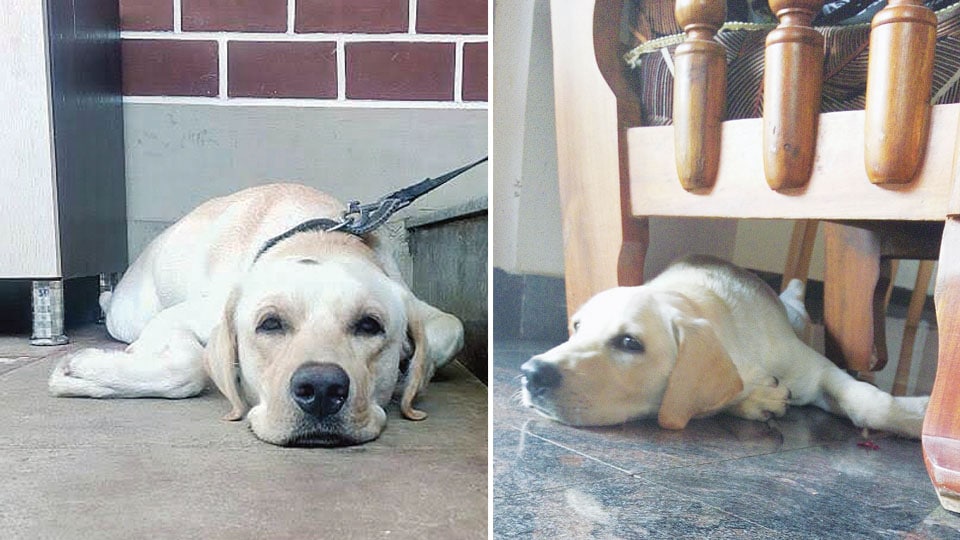In this week’s Pet Talk, Maneka speaks about mood swings in dogs and need to change diet as they grow old
By Maneka Gandhi
Do dogs have mood swings?
Yes, dogs also go through mood swings especially during puberty, pregnancy and because of noises. Michigan State University researchers found that not only do dogs have full, unique personalities; but they also go through mood changes based on the attitudes and behaviour of their owners.
My dog keeps circling round and round. Is this a habit? Is he bored?
Dogs who can’t stop walking in circles may have a health issue. Yes, sometimes it’s fun to chase tail, but if your pup can’t shake the compulsion, there’s a problem beneath the surface. Ear infections may cause circling. Older dogs may suffer from idiopathic vestibular syndrome where the balance is disturbed or it could be poisoning or a brain tumour.
I recently rescued a dog and he waits till I sit down and then he stands in the arch made by my legs. Is this possessive behaviour?
It’s a sign of anxiety or nervousness. “Dominance” is rarely the problem; your dog is probably trying to feel safer by staying close.
Does the diet of dogs reduce over the years?
Yes. Older dogs tend to be overweight because of their slow metabolism. They need 20% less calories than the adult dogs and need more fibre and protein. Water should always be available to them. Tempting them with new dishes is a good idea.
Why do dogs have hair fall?
A very common cause of hair loss in dogs is an infestation by parasites such as mites, lice or fleas. This leads to intense itching or scratching, which in turn can cause hair loss. Another common reason is mange, an infestation of the scabies mite or fungal infection. Other than this there can be few more reasons like eczema or dandruff, nutritional deficiencies, ovarian or testicular tumours, Cushing’s disease and hypothyroidism. As soon as the hair starts falling get a blood and skin test.
How much better is the dog’s sense of smell than humans?
When it comes to nose sensitivity, dogs are the paws-down winners over humans. Numbers abound about how much better a dog’s sense of smell is than ours. Dog’s sense of smell is from 10 to 100 to 1,000 to 10,00,000 times better. They can detect some, if not most, odours at concentrations of parts per trillion. So don’t put your smelly unwashed mouth in front of their face !
Which shampoo is the best for dogs?
Canine skin is more alkaline than human skin, so shampoos with any added fragrances, like chamomile, lavender, eucalyptus or citrus, are not good for dogs as these may sting or burn your dog’s skin. And the ph level is also an important factor when you buy any dog shampoo, the correct ph level is 5.5 to 7.2 for canine skin.
Why are dogs always hungry?
Dogs are not always hungry, but it is true that if you get them used to begging from the table, or from visitors, and you allow them to eat sweets and other things that are not on the menu they will constantly ask for them. But dogs need to be fed proper food and varied food with cereals, proteins and carbohydrates and vegetables and they may need to eat thrice a day, rather than once or twice a day.
Why do dogs feet smell like corn chips?
Frito feet, or the smell which comes from dogs feet, is mostly likely caused by the bacteria Proteus or Pseudomonas. These create a “yeasty” smell. Another cause of the odour is sweat which gets lodged between your pet’s paw pads and fur.
How can I clean my dog’s mouth?
Dogs’ oral structure and shape of teeth is actually much more sensitive and delicate than humans. In the beginning, use your finger, apply paste on your finger and slowly and gently scrub their teeth, once they start feeling comfortable use brushes or finger brushes. Do Not Use Human Toothpaste. It contains dangerous chemicals for dogs as they do not spit it out.
Why do dogs sit in corners or under tables or under sofas?
This is a common behaviour in dogs as it helps them to feel protected, comfortable and relaxed. Sometimes this behaviour is because the dogs have been abused or are afraid of their environment.
After how many days can we take our puppy for a walk on the street?
It is recommended to wait until 10-14 days after your puppy’s last vaccination booster, which is usually around 14-15 weeks of age, before taking them on walks.
Why are sweet things bad for my dog?
Sugar is not toxic to dogs, but over time, feeding your dog sugary treats can result in obesity that can shorten their lifespan and cause multiple secondary problems like diabetes.
Can dogs catch fever after vaccines?
Yes, it is common for the dogs to experience mild fever after vaccines. But if it lasts for more than a day or two, it is advisable to consult your veterinarian.
Why does my puppy always urinate on the carpet?
Puppies prefer to urinate on something which is absorbent like carpets, grass and so on, as it helps them avoid getting their paws wet.
Can cows swim?
Yes, cows are great swimmers.
Can cows jump?
Cows will jump when playing around or kicking up their heels. What is really nice is to watch a new-born calf discover how to jump. They will stand in one place and jump straight up in the air while they let out a small “moo”.
Do cows get protective of their young ones?
Cows show fear, interest, protectiveness, eagerness, and curiosity. They do feel strong urges to protect their young and are immensely protective for them.
Do cows get frightened?
Cows in unsafe situations exhibit fear, such as those caused by expectations of danger, pain or disaster. This can be detected by
Increased defecation and urination.
Standing with front feet in stalls and rear feet in walkways.
Increased standing and less lying.
Increased lying time and less frequent standing and repositioning themselves in stalls.
Sudden movements or noises are very threatening to cows. Moving and handling animals in a calm, quiet way can significantly reduce fear.
Cows can find novelty fearful and are generally afraid of sudden changes to facilities and routines. Keeping environmental features, such as lighting, floor surfaces or levels, and fences or wall types, as consistent as possible will help to reduce fear. If cows become fearful in a new situation, try and allow them some time to familiarise themselves with the new environment before introducing further changes or other stressful procedures.
Fear responses during movement make cows more prone to slipping, falling and injuries (example: pelvic and hip injuries due to falling, hoof injuries during slipping leading to lameness, for example) and compromise their welfare.








Recent Comments